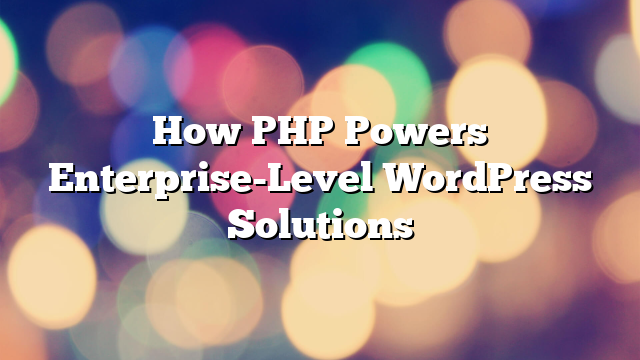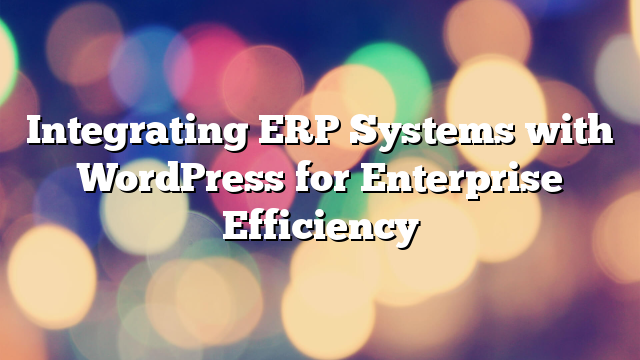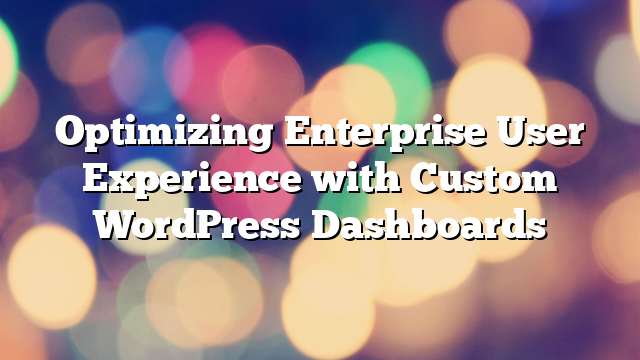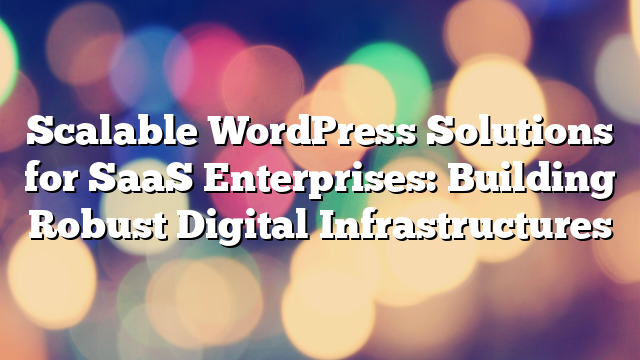How PHP Powers Enterprise-Level WordPress Solutions
11.10.2024

PHP has been the backbone of WordPress since its inception, and for enterprise-level WordPress solutions, it continues to play a critical role. With more than 40% of the web powered by WordPress, PHP’s ability to handle scalability, flexibility, and customization is why many enterprises trust it for their high-performance websites. In this article, we’ll explore how PHP enhances enterprise-level WordPress solutions and why it remains an essential technology for businesses looking to build scalable, secure, and feature-rich websites.
The Role of PHP in WordPress
PHP is an open-source scripting language primarily used for web development. It powers the server-side functionality of WordPress, enabling the platform to handle everything from dynamic content generation to database interactions. For enterprises, PHP offers several advantages that make WordPress an ideal content management system (CMS) for large-scale projects.
WordPress itself is built using PHP, which means that all themes, plugins, and custom functionalities are developed in PHP. Enterprises looking to extend the capabilities of WordPress can leverage the language to develop custom features that meet their unique business needs.
Why PHP is Ideal for Enterprise-Level WordPress Development
PHP’s flexibility and widespread use make it an excellent choice for enterprise-level WordPress development. Here are some key reasons why:
1. Scalability for High-Traffic Websites
Enterprise websites often need to handle massive amounts of traffic, and PHP is well-suited for building scalable WordPress solutions. PHP’s ability to handle large-scale web applications means enterprises can rely on WordPress to manage high traffic volumes while maintaining optimal performance.
By leveraging PHP’s scalability, developers can build custom caching systems, optimize database queries, and implement load balancing to ensure that WordPress sites perform efficiently, even during peak traffic times. This is particularly important for eCommerce sites, media companies, or enterprises with a global audience, where uptime and speed are crucial.
2. Flexibility and Customization
One of the main reasons enterprises choose WordPress is its flexibility, and PHP plays a significant role in enabling that flexibility. PHP allows developers to build custom themes, plugins, and integrations that cater specifically to an enterprise’s unique requirements. Whether it’s integrating with third-party platforms, creating custom APIs, or developing specific features, PHP’s versatility ensures that WordPress can be tailored to meet any business need.
Additionally, PHP frameworks such as Laravel and Symfony can be integrated with WordPress to enhance its functionality further. These frameworks provide advanced tools for building enterprise-level applications, giving developers more flexibility in customizing the WordPress experience for large organizations.
3. Seamless Integration with Enterprise Systems
Enterprises often rely on a suite of other tools and platforms—such as customer relationship management (CRM) systems, enterprise resource planning (ERP) software, and marketing automation platforms. PHP makes it easy to integrate WordPress with these external systems, ensuring seamless data sharing and functionality across platforms.
For example, using PHP, developers can create custom APIs that connect WordPress to platforms like Salesforce, HubSpot, or SAP, allowing enterprises to centralize their operations and manage everything from a single interface. This level of integration is critical for businesses that want to streamline workflows, improve efficiency, and deliver a better digital experience to their users.
4. Security Enhancements
Security is a top concern for enterprises, and PHP provides several tools and best practices to help developers build secure WordPress applications. While WordPress is inherently secure, enterprises often need additional layers of protection to safeguard sensitive data and user information.
PHP allows developers to implement robust security measures, such as input validation, data sanitization, and encryption, to protect WordPress sites from common vulnerabilities like SQL injection, cross-site scripting (XSS), and cross-site request forgery (CSRF). Enterprises can also use PHP to integrate third-party security services, such as firewalls and malware scanners, ensuring that their WordPress environment remains protected from external threats.
5. Cost-Effectiveness
PHP’s open-source nature means that it’s a cost-effective solution for enterprises. Unlike proprietary platforms, PHP and WordPress come with no licensing fees, allowing businesses to allocate more resources to custom development and performance optimization. Moreover, the widespread availability of PHP developers makes it easier for enterprises to find the talent they need to build and maintain their WordPress websites without incurring high development costs.
6. Large Developer Community and Support
One of the most significant advantages of PHP is its massive developer community. With millions of developers actively contributing to PHP projects, enterprises have access to a wealth of resources, plugins, and libraries that can accelerate development and improve site performance. This large community also ensures that PHP stays up-to-date with the latest security patches and performance improvements, making it a reliable choice for enterprise-level WordPress development.
Additionally, enterprises can benefit from extensive documentation, tutorials, and forums where developers share solutions to common challenges. This wealth of information can help businesses address any technical issues quickly and efficiently.
PHP Performance Optimizations for WordPress
To ensure that enterprise-level WordPress websites perform optimally, developers often employ several PHP-based performance optimization techniques:
1. Caching Solutions
Caching is one of the most effective ways to improve WordPress performance, especially for high-traffic enterprise sites. PHP allows developers to implement various caching solutions, such as object caching and full-page caching, to reduce the load on the server and deliver content faster to users. Tools like Redis, Memcached, or server-level caching solutions can be integrated into WordPress using PHP to enhance performance.
2. Code Optimization
PHP developers can optimize code by minimizing database queries, reducing server-side processing, and ensuring that WordPress functions efficiently. Code optimization involves refactoring inefficient code, using native PHP functions whenever possible, and reducing unnecessary dependencies that may slow down the site.
3. Database Optimization
WordPress relies on MySQL or MariaDB databases, and PHP plays a key role in querying and interacting with these databases. Enterprises can use PHP to optimize database queries, create custom indexing, and ensure that their databases are running at peak performance. Tools like WP-Optimize can be used to regularly clean up and optimize the database, ensuring that the site remains fast and responsive.
Conclusion
PHP remains a cornerstone of enterprise-level WordPress development, providing the flexibility, scalability, and security needed to build and maintain large-scale websites. With PHP, enterprises can customize WordPress to meet their unique needs, integrate with other business systems, and optimize their websites for high traffic and performance.
If your business is ready to leverage the power of PHP in WordPress development, contact AllWebDev to learn how we can help you build scalable, secure, and high-performance WordPress solutions for your enterprise.



